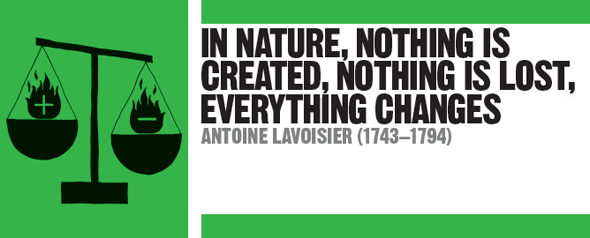
IN CONTEXT
Chemistry
1667 German alchemist Johann Joachim Becher proposes that things are made to burn by a fire element.
1703 German chemist Georg Stahl renames it phlogiston.
1772 Swedish chemist Carl-Wilhelm Scheele discovers “fire air” (later called oxygen) but does not publish his findings until 1777.
1774 Joseph Priestley isolates “dephlogisticated air” (later called oxygen) and tells Lavoisier about his findings.
1783 Lavoisier confirms his ideas on combustion with experiments on hydrogen, oxygen, and water.
1789 Lavoisier’s Elementary Treatise on Chemistry names 33 elements.
French chemist Antoine Lavoisier brought a new level of precision to science, not least by naming oxygen and quantifying its role in combustion. By taking careful measurements of mass in the chemical reactions that occur during combustion, he demonstrated the conservation of mass – the principle that, in a reaction, the total mass of all the substances taking part is the same as the total mass of all its products.
Lavoisier heated various substances in sealed containers and found that the mass a metal gained when it was heated was exactly equal to the mass of air lost. He also found that burning stopped when the “pure” part of the air (oxygen) had all gone. The air that remained (mostly nitrogen) did not support combustion. He realized that combustion therefore involved a combination of heat, fuel (the burning material), and oxygen.
Published in 1778, Lavoisier’s results not only demonstrated the conservation of mass, but also, by identifying oxygen’s role in combustion, demolished the theory of a fire element called phlogiston. For the past century, scientists had thought inflammable substances contained phlogiston and released it when they burned. The theory explained why substances such as wood lost mass on burning, but not why others, such as magnesium, gained mass on burning. Lavoisier’s careful measurements showed that oxygen was the key, in a process during which nothing was added or lost, but all was transformed.
"I consider nature a vast chemical laboratory in which all kinds of composition and decompositions are formed."
Antoine Lavoisier
See also: Joseph Black • Henry Cavendish • Joseph Priestley • Jan Ingenhousz • John Dalton